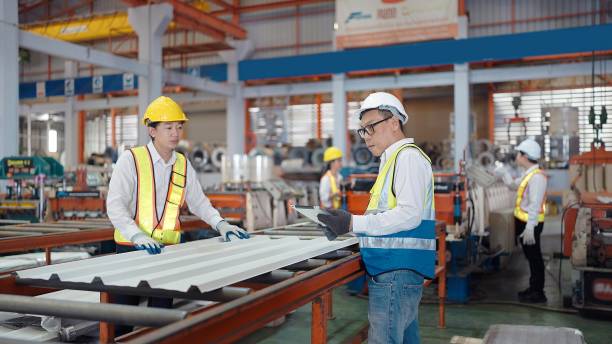How to work in construction companies in Toronto?
Construction companies in Toronto are looking for Arabic-speaking workers. This sector offers stable opportunities with a constant demand for labor. What are the application requirements, and how can people with no experience take advantage of these opportunities? Find out everything you need to know here.

What are the current trends in Toronto’s construction job market?
Toronto’s construction sector is experiencing steady growth, with a constant demand for labor across various projects. From residential developments to commercial buildings and infrastructure improvements, the city’s skyline is continually evolving. This growth translates to stable employment opportunities for those seeking work in the construction industry.
One notable trend is the increasing demand for Arabic-speaking workers in Toronto’s construction companies. This requirement stems from the diverse workforce and the need for effective communication on job sites. For Arabic speakers looking to enter the construction field, this presents a unique advantage in the job market.
What qualifications are required for construction jobs in Toronto?
The qualifications required for construction jobs in Toronto can vary depending on the specific role and level of expertise. However, some general requirements include:
-
Safety certifications: Workers must complete mandatory safety training, such as the Ontario Ministry of Labour’s Working at Heights Training and the Occupational Health and Safety Awareness Training.
-
Trade certifications: For specialized roles, such as electricians, plumbers, or carpenters, relevant trade certifications or apprenticeships may be required.
-
Physical fitness: Construction work often involves manual labor, so good physical condition is essential.
-
Basic English proficiency: While Arabic-speaking workers are in demand, a basic understanding of English is typically necessary for workplace safety and communication.
-
Work permits: Non-Canadian residents must have valid work permits or permanent residency status.
How can individuals with no experience enter the construction industry?
For those without prior experience in construction, there are several pathways to enter the industry:
-
Apprenticeship programs: Many trades offer apprenticeship opportunities that combine on-the-job training with classroom instruction.
-
Entry-level positions: Roles such as general laborers or construction helpers often require minimal experience and can serve as stepping stones to more specialized positions.
-
Vocational training: Enrolling in construction-related courses at vocational schools or community colleges can provide valuable skills and knowledge.
-
Networking: Attending job fairs, joining construction-related associations, or connecting with industry professionals can open doors to entry-level opportunities.
-
Temporary staffing agencies: Some agencies specialize in construction placements and can help newcomers gain experience through short-term assignments.
What are the typical materials and equipment used on Toronto construction sites?
Construction sites in Toronto utilize a wide range of materials and equipment, including:
-
Concrete, steel, and wood for structural elements
-
Drywall, insulation, and roofing materials for building envelopes
-
Electrical wiring, plumbing pipes, and HVAC components for mechanical systems
-
Heavy machinery such as excavators, cranes, and bulldozers
-
Power tools like drills, saws, and nail guns
-
Scaffolding and ladders for elevated work
Familiarizing yourself with these materials and equipment can give you an advantage when seeking construction jobs in Toronto.
What safety measures are important in Toronto’s construction industry?
Safety is paramount in Toronto’s construction industry. Key safety measures include:
-
Personal Protective Equipment (PPE): Hard hats, safety glasses, steel-toed boots, and high-visibility vests are mandatory on most sites.
-
Fall protection systems: Harnesses, guardrails, and safety nets are used for work at heights.
-
Proper signage: Construction sites feature clear warning signs, designated pathways, and emergency information in both English and French.
-
Regular safety meetings: Daily or weekly toolbox talks address specific safety concerns and reinforce best practices.
-
Equipment inspections: Regular checks of tools, machinery, and safety equipment are conducted to ensure proper functioning.
Understanding and adhering to these safety measures is crucial for anyone working in Toronto’s construction industry.
How can Arabic-speaking workers apply for construction jobs in Toronto?
Arabic-speaking individuals interested in construction jobs in Toronto can follow these steps:
-
Prepare a resume highlighting relevant skills, certifications, and language abilities.
-
Search job boards like Indeed, Workopolis, or JobBank for construction positions that specifically mention Arabic language skills as an asset.
-
Connect with staffing agencies that specialize in construction placements, such as Hays, Randstad, or LaborWorks.
-
Reach out to large construction companies in Toronto, like EllisDon, PCL Construction, or Aecon Group, as they often have diverse workforce initiatives.
-
Attend job fairs and networking events organized by construction industry associations or cultural organizations.
-
Consider joining unions like LiUNA Local 183, which represents construction workers and can provide job placement assistance.
-
Utilize social media platforms like LinkedIn to connect with construction professionals and companies in Toronto.
| Company | Services Offered | Key Features/Benefits |
|---|---|---|
| EllisDon | General contracting, construction management | Large-scale projects, diverse workforce |
| PCL Construction | Commercial, industrial, and civil construction | Employee-owned company, training programs |
| Aecon Group | Infrastructure development, urban construction | Wide range of projects, career advancement opportunities |
| Mattamy Homes | Residential construction | Largest homebuilder in Canada, entry-level positions available |
| Tridel | Condominium development and construction | Focus on sustainable building, employee development programs |
In conclusion, the construction industry in Toronto offers promising opportunities for Arabic-speaking workers and those new to the field. By understanding the qualifications required, familiarizing yourself with common materials and safety practices, and utilizing the right resources for job searching, you can successfully navigate your way into a rewarding career in Toronto’s construction sector.




